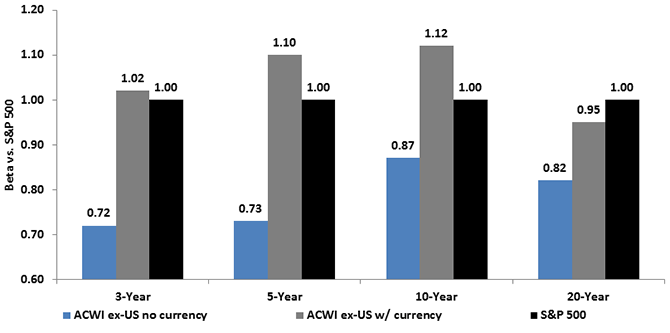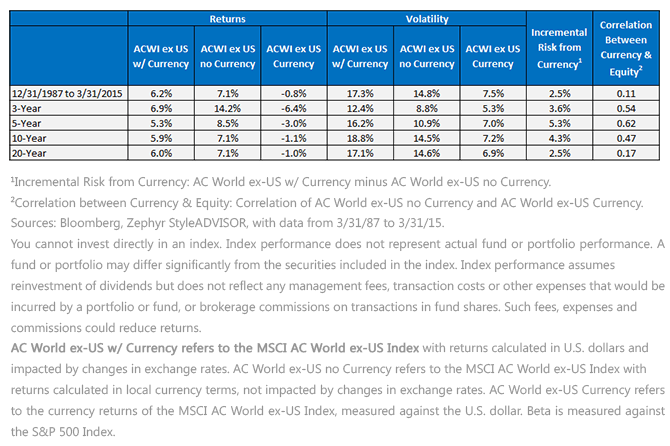While many U.S. investors find familiarity and comfort investing in their home market, the fact remains that the U.S. equity market represents only about half of the world’s equity opportunity set
1. Thus far in 2015, international markets have generally outperformed the U.S., showcasing the potential benefit of being internationally diversified.
When U.S. investors buy equities abroad, either directly or through a fund, they may not realize it but there are two potential sources of return—and
risk—in that investment decision: the equities themselves and the currencies of the markets in which those equities are listed. Both of these factors can significantly impact the investment experience.
Addressing the Currency Risk
For more than five years, WisdomTree has shown investors how to neutralize one of these sources of risk through its introduction of
currency-hedged equities to the exchange-traded fund (ETF) structure. This approach helps investors to hedge one source of uncertainty—exchange rate fluctuations relative to the U.S. dollar—and to focus more purely on investing in the stocks themselves. It’s an approach that we think fits well with investors who believe that over longer time horizons currency returns tend to sum to zero. Put another way, if there is little to no expected return, but an additional source of
volatility, why
layer currency exposure on top of international equity exposure?
Global ex-U.S. Equities Had Lower Volatility Than the S&P 500 Index When Currency Was Removed2
Perhaps the best way to illustrate this point is to show how stocks outside the U.S. have performed over the last three decades with—and without—currency exposure. When looking at the risk and the returns of
MSCI AC World ex-US Index back to 1987, two key takeaways become evident: Foreign currency exposure added to the volatility of the index, and foreign currency exposure served as a negative source of return compared to how the stocks performed with no currency impact.
Isolating a Source of Uncompensated Risk

 For definitions of indexes and terms in the above chart, visit our glossary.
For definitions of indexes and terms in the above chart, visit our glossary.
•
Currency Exposures Significantly Raised Volatility: Using the
beta statistic measured against the S&P 500 Index—one of the most widely followed for any U.S. equity investor—we can see that the MSCI AC World ex-US with no currency exposure exhibited a value significantly below 1.00, meaning lower market risk than the S&P 500 Index. The MSCI AC World ex-US with currency—an index of the same underlying equities—showed a beta above 1.00 compared to the S&P 500 Index over the past three-, five- and ten-year periods.
• Over the last 20 years and since the MSCI AC World ex-US Index was calculated, currency risk added an incremental 2.5% volatility on top of the MSCI AC World ex-US calculated in local currency terms (or with no currency risk added on top). Due to rising
correlations between equity markets and the currency markets over the latest five years, this incremental contribution to risk provided by currency was twice the long-term average at 5.3%.
Investors have been employing a home country bias in allocations, often because currency risk added to the volatility profile of international equities. Focusing on local market returns through currency-hedged offerings can help target the local market return more directly, reducing the risk profile of international equities and allowing investors to achieve more proper international diversification without making as big a bet on the U.S. markets.
Introducing the WisdomTree Global ex-U.S. Hedged Dividend Index
To provide exposure to this broad asset class—developed world and emerging market stocks outside the U.S.—WisdomTree designed the Global ex-U.S. Hedged Dividend Index. The Index represents exposure to 40 distinct markets and is designed to hedge exposure to 29 currencies. The cost to hedge, dominated by the annualized difference in one-month
interest rates between the U.S. and each targeted market, is 0.63%
3.
Company Weightings: The Index also makes use of WisdomTree’s
Dividend Stream® weighting methodology. Simply put, the 1,000 largest companies by
free-float adjusted market capitalization are selected from a universe of global ex-U.S. dividend payers and then weighted by the cash dividends paid over the prior annual cycle.
Country Exposures: Country exposures are adjusted at each annual rebalance, such that they match the free float-adjusted market capitalization-weighted exposures defined by the 1,000 select companies.
Using the WisdomTree Global ex-U.S. Hedged Dividend Fund as a Pure Play on Global ex-U.S. Equities
The
WisdomTree Global ex-U.S. Hedged Dividend Fund (DXUS) is designed to track the performance of the WisdomTree Global ex-U.S. Hedged Dividend Index before fees and expenses. DXUS represents WisdomTree’s broadest option in the category. For more information on the exposures of this Fund, please
click here.
1Source: Bloomberg. Refers to how the
MSCI AC World Index, a broadly recognized global benchmark, had approximately half of its weight in stocks outside the United States as of 5/22/15.
2Global ex-U.S. equities refers to the MSCI AC World ex-US Index universe.
3Source: Bloomberg, with data measured as of 3/31/15.
Important Risks Related to this Article
This Fund is new and has limited operating history. Hedging can help returns when a foreign currency depreciates against the U.S. dollar, but it can hurt when the foreign currency appreciates against the U.S. dollar. There are risks associated with investing, including possible loss of principal. Foreign investing involves special risks, such as risk of loss from currency fluctuation or political or economic uncertainty. Investments in emerging markets are generally less liquid and less efficient than investments in developed markets and are subject to additional risks, such as risks of adverse governmental regulation and intervention or political developments. To the extent the Fund invests a significant portion of its assets in the securities of companies in a single country or region, it is likely to be impacted by the events or conditions affecting that country or region. Dividends are not guaranteed, and a company currently paying dividends may cease paying dividends at any time. The Fund uses various strategies to attempt to minimize the impact of changes in foreign currency against the U.S. dollar, which may not be successful. Derivative investments can be volatile, and these investments may be less liquid than other securities, and more sensitive to the effects of varied economic conditions. The Fund invests in the securities included in, or representative of, its Index regardless of their investment merit, and the Fund does not attempt to outperform its Index or take defensive positions in declining markets. Due to the investment strategy of this Fund, it may make higher capital gain distributions than other ETFs. Please read the Fund’s prospectus for specific details regarding the Fund’s risk profile.



 For definitions of indexes and terms in the above chart, visit our glossary.
For definitions of indexes and terms in the above chart, visit our glossary.


